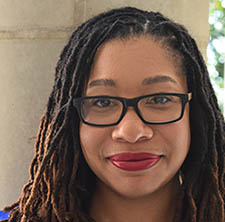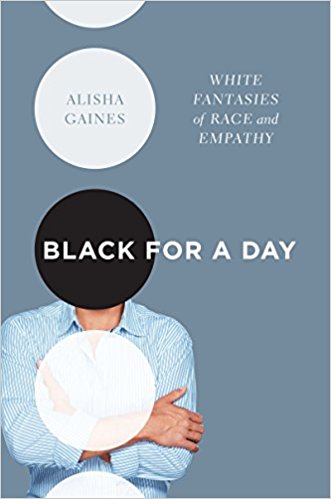Alisha Gaines Investigates “Empathetic Racial Impersonation” in Her New Book, Black for a Day
 Assistant Professor Alisha Gaines places her first book-length publication, Black for a Day: White Fantasies of Race and Empathy (U of North Carolina P, 2017), high on her list for career achievements.
Assistant Professor Alisha Gaines places her first book-length publication, Black for a Day: White Fantasies of Race and Empathy (U of North Carolina P, 2017), high on her list for career achievements.
Although the sense of accomplishment was rewarding for Gaines, she says a recent review of her book left her humbled. In CHOICE, a publication of the Association of College and Research Libraries, reviewer G. Schlesselman-Tarango gave her synopsis of Black for a Day and ended with a correlation to one of the all-time great authors.
"Gaines chronicles white impersonations of blackness in the US, revealing the ways experiments in racial empathy obscure the structural character of racism and instead frame personal experiences of otherness and individual awakening as racial progress,” Schlesselman-Tarango writes. “Looking to the experiments of journalists Ray Sprigle, John Howard Griffin, and Grace Halsell and at contemporary iterations of racial impersonation such as the reality TV show Black.White., Gaines exposes the contours of failed ‘allyship.’ In an attempt to understand blackness by embodying it, this sort of selfcongratulatory impersonation in fact centers white experience while erasing black testimony. In tracing the steps of these failed allies, the author uncovers the ways race intersects with class, sexuality, gender, region, and family. In an intriguing move, Gaines ends with the curious case of Rachel Dolezal, whose story challenges the impermanence of past experiments in blackness. This volume pairs well with Shannon Sullivan’s Good White People: The Problem with Middle-Class White AntiRacism and Toni Morrison’s Playing in the Dark: Whiteness and the Literary Imagination.”
That final sentence astonished Gaines when she read the review.
“That anyone would mention my work alongside High Priestess Toni Morrison is the most wonderful and humbling thing that could ever happen to me. EVER,” Gaines says.
 The general theme of Black for a Day is rooted in her life-long appreciation for Michael Jackson, and the more formal research process started during Gaines’s graduate studies at Duke University, which resulted in her dissertation on race, liberalism, and performance entitled “Spectacles of American Liberalism: Narratives of Racial Im/posture.”
The general theme of Black for a Day is rooted in her life-long appreciation for Michael Jackson, and the more formal research process started during Gaines’s graduate studies at Duke University, which resulted in her dissertation on race, liberalism, and performance entitled “Spectacles of American Liberalism: Narratives of Racial Im/posture.”
Gaines was a few months past her doctoral preliminary exams in 2006 when she first saw FX’s cable show, Black.White. The show centered on two suburban families, one black and one white, as they “switched races.”
“I was raptured,” Gaines says. “I wanted to know if their racial impersonation had a history or a purpose.”
That opened her discovery into the subject and, combined with her longtime admiration for Jackson – “his ability to move across identity categories sparked my early interest in identity, borders, performance, and racial play,” Gaines says – led to her dissertation. Although her final paper did not answer all of her questions about race and impersonation, her new book gave her the vehicle to delve deeper into the topics.
“Black for a Day allowed me to fully investigate what I now call ‘empathetic racial impersonation,’” Gaines says. “Beginning from Finian's Rainbow to the social media controversy about Rachel Dolezal, Black for a Day allowed me to revisit my initial interest in the 2006 TV show and create the book's unique genealogy.”
The book’s introduction explores Gaines’s experiences as a ninth grader, when she worked backstage on Finian’s Rainbow and helped turn the student playing Senator Billboard Rawkins from white to black.
“I was completely unaware of the irony of this blackface moment—even as I stood in the bathroom washing away the much-darker-than-me paint from my streaked hands that had just turned Joe ‘black,’” Gaines writes. “My parents worked to keep me in this private school, and although none of us had the vocabulary of ‘respectability politics’ in 1996, those politics were at work. As a token black family, success meant not making waves and seizing any and all, often problematic, opportunities. Although back then I did not yet understand the meaning of my skin color, I now know that my black hands were the school’s alibi against complaints by anyone who might have accused it of racial insensitivity. There were no complaints.”
The book’s four chapters and epilogue focus on Black.White. and four individuals – Sprigle, Griffin, Halsell, and Dolezal – and it examines their experiences and connections with the book’s theme.
“When I dug in and did research for the book well beyond my dissertation, I realized I was carving out a unique history through five individuals and their subsequent memoirs,” Gaines says. “Each chapter details a moment in history through their well-intentioned and maddeningly uncomfortable empathy. I looked for white folks who could stand as awkwardly well-intentioned icons of allyship.”
Jonathan Holloway, provost of Yale University and scholar of post-emancipation United States history with a focus on social and intellectual history, and Marvin McAllister, assistant professor of English and African American studies at the University of South Carolina, both praise Gaines for her deft handling of the subject matter.
“Fresh and incisive, Black for a Day delivers a smart examination of what's at stake when people attempt to cross racial lines temporarily,” Holloway writes. “Alisha Gaines’s nuanced examination on the many complicated layers that inform the ‘black experience’ makes this book a timely and important read.” McAllister calls the book “a substantial and impressive examination of race and performance,” and writes, “Alisha Gaines constructs a genealogy of cross-racial empathy that raises the stakes for how we represent and receive black bodies in the twenty-first century."
Those closer to Gaines have sometimes approached her with some discomfort because Amazon associates Black for a Day with Dolezal’s memoir, a reaction from her colleagues and friends Gaines finds amusing.
“Just this past week, my brother-in-law whispered, ‘So, I googled your book. I don't want to tell you what came up.’ ‘Dolezal's memoir?,’ I suggested. ‘It’s ok,’ I assured him,” Gaines says. “According to Amazon’s algorithms, my book and Dolezal’s memoir will be forever linked as ‘frequently bought together.’ I don’t see this linking as a problem.”
Gaines carried out most of her research at Texas Christian University and Columbia University. TCU’s library holds boxes of Halsell’s papers and photographs, and Gaines visited those archives multiple times. Griffin’s diaries are kept at Columbia, where the librarians were “quick and knowledgeable,” Gaines says.
“If I needed a box of John Howard Griffin’s diaries, they didn't hesitate to get it to my table—even if they had to find it in their extensive archives,” she adds. “I could not have written this book without the patience and diligence of the librarians at TCU and Columbia.”
Gaines also appreciated her relationship with UNC Press during the publishing process, and she especially loves the book’s cover. After everything was completed, though, she had a few months of what she calls “ghost booking.”
“I would wake up in a panic and think, ‘I haven’t written in DAYS . . . get to your office and finish writing.’ I’d scurry to my office and then see the box of finished books on my side table,” she says. “‘Oh, right,’ I would think, ‘I wrote a book!’ Since the book was such a dominant part of my life for so long, it took awhile for me to realize I was actually done writing it.”
With the book’s availability for scholars and readers, and her “ghost booking” behind her, Gaines looks forward to working on her next two book projects, one a biography of Grace Halsell, and the other about black masculinity in the 1990s.
“The first is a very clear descendent of Black for a Day,” Gaines says. “The second is about my love of Michael Jackson.”

